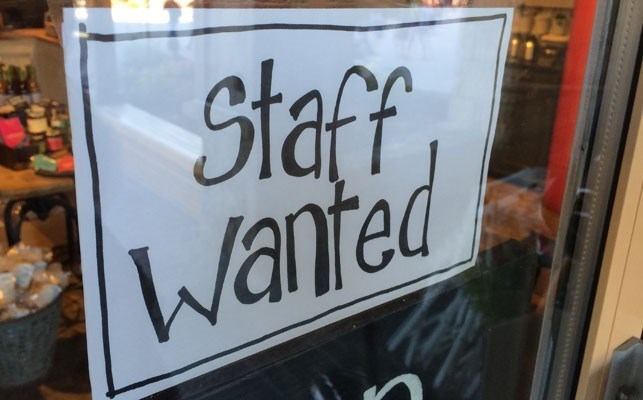For years, we’ve been hearing about the struggles Whistler employers often deal with trying to staff their businesses, but with the restrictions on travel and foreign-worker recruitment due to the pandemic, the resort’s labour picture is looking even more dire than usual this winter.
In a recent Whistler Chamber of Commerce labour survey, 68 per cent of respondents with 50 or more employees said that, despite ramping up domestic recruitment, they did not have enough staff this summer and predict they will not have enough employees for the upcoming winter season.
It’s prompted the chamber to continue pushing both the federal and provincial governments to improve the accessibility of existing foreign-worker programs as a means to hire staff for hard-to-fill positions.
“There’s some low-hanging fruit that has come out of this survey, which we knew about before, but what impacts our ability to move the dial forward on some of these programs is that now we have data that pushes the government to see exactly where we land with some of these foreign worker programs,” said chamber CEO Melissa Pace in a follow-up interview.
In the short term, the chamber is lobbying Victoria to resume allowing applicants in the hospitality and food-service sectors to be considered for B.C.’s Provincial Nominee Program (PNP), which has historically brought high-demand foreign workers and entrepreneurs to the province to gain permanent residency.
“What they did in March when COVID hit was they took out some of the most crucial jobs that we have here in our community … from the B.C. PNP program,” Pace noted. “There is now a big void.”
Federally, the chamber has drafted a resolution for the Canadian Chamber of Commerce AGM later this month that calls on Ottawa to implement a trusted employer initiative that would allow for expedited processing for companies that have previously used the Temporary Foreign Worker Program (TFWP) and pass a compliance review. It also asks the federal government to create direct pathways for more temporary foreign workers to gain permanent residency, as well as working to improve public opinion and understanding of the program.
The survey results hit home on just how reliant Whistler businesses really are on foreign workers. Prior to the pandemic, for instance, local businesses said less than half of job applicants were Canadian or had Permanent Resident status, while more than a third—35 per cent—of Whistler’s workforce had Working Holiday visas. In all, roughly 45 per cent of the resort’s workforce are foreign workers of some kind, compared to less than three per cent nationally. A vast majority—73 per cent—of local businesses polled said foreign-worker programs are important or very important to their success.
“It’s a very solid component of our staffing, but we pivot as well and the circumstances are such that our business demand will drive how much staffing we need this winter,” noted Hotel Association of Whistler president Saad Hasan, adding that staffing levels haven’t been as much of a challenge just yet for the hotel sector.
Part of that is the wider reach larger hotel brands have when it comes to bringing in staff from other locations and a doubling down on domestic recruitment this year.
Hasan was quick to note, however, that recruitment for the winter season got underway later than usual this year as hotels dealt with the effects of the pandemic, adding that many “absolute frontline” positions, such as dishwashers, remain unfilled.
“We are reaching out across Canada, for sure, but what we anticipate is that we will have ample staff to service our guests,” he said.
According to the chamber’s survey, the five positions Whistler businesses said were most commonly filled by foreign workers were cooks, servers, restaurant hosts/reception, guest services and supervisor or managerial roles.
Of course, there remains considerable uncertainty around what Whistler’s visitation levels will look like this winter, but Hasan said that however tourism levels shake out, the hotel sector will be relying on similar staffing numbers as years past.
“We are preparing for a normal winter, with certainly some reductions in occupancy, but at the same time, we aren’t planning for a drastically reduced staff because we feel that the service demands will be higher than a normal year,” he said, referring to the increased COVID health and sanitation protocols.
Looking ahead, Pace is hopeful the chamber can work with the wider community to develop a recruitment strategy that targets Canadians.
“The longer this lasts and the longer global travel is closed, the more important it’s going to be for us to hire Canadians and make our community a place where they want to work, live and play,” she said.
But that solution isn’t as simple as ramping up recruitment, Pace added. Making Whistler more desirable to domestic workers would require the resort to look at ways to improve everything from affordability and housing, to daycare and regional transit.
One idea is to increase the number of Indigenous employees in Whistler’s workforce, which Pace said currently hovers around two per cent. A key piece of that puzzle will be finding a long-awaited funding arrangement with the province for the Sea to Sky’s regional transit concept, which would ideally connect Mount Currie to Whistler and beyond. But it will also require additional training to better support Indigenous workers, Pace said.
“There’s definitely a desire that we see from the survey results that the community would like more cultural education on working with our Indigenous community, so that’s something we’re going to work on,” she added.




